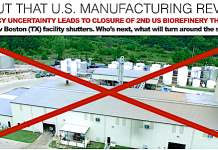by Debra Fiakas CFA
 Few would make the connection, so Methes Energies International (MEIL: Nasdaq) chief executive office explains his company’s unusual business model in McDonald’s terms. Methes, which is a contraction of ‘methyl ester,’ has developed a biodiesel system that accommodates various feedstocks that yield methyl esters. The system is a handsome, compact configuration of stainless steel tanks and piping that are all capable of automated operation.
Few would make the connection, so Methes Energies International (MEIL: Nasdaq) chief executive office explains his company’s unusual business model in McDonald’s terms. Methes, which is a contraction of ‘methyl ester,’ has developed a biodiesel system that accommodates various feedstocks that yield methyl esters. The system is a handsome, compact configuration of stainless steel tanks and piping that are all capable of automated operation.
The company operates its own commercial-scale facilities in Ontario, Canada. Sales of biodiesel represent the majority of Methes revenue, which totaled $10.3 million in the twelve months ending September 2012. This first leg of the Methes business model is comparable to sales of Big Macs at McDonald’s company owned stores.
Two models of the Methes system are available for sale as turn-key biodiesel plants. It is an attractive market in the U.S., Canada and Europe where government mandates require transport fuel producers to blend a minimum amount of renewable sources into fuel before it is sent to the gas station. In the U.S. gas blenders must purchase a minimum of 1.3 trillion gallons of renewable fuel in 2013 and 1.6 trillion gallons in 2014.
Few gas producers have invested in their own renewable fuel capacity. One exception might be Valero (VLO: NYSE) which snapped up ethanol plants from Vera Sun and others after the wave of bankruptcies in that sector in 2009. Valero also has a renewable diesel joint venture with food-by product recycler Darling International (DAR: NYSE) that is expected to go into production in the first quarter 2013. The vast majority of the renewable fuel mandate must come from independent producers.
It makes sense for aspiring renewable fuel players to use a proven system and tap the expertise of an established player. Methes sells licenses for its turn-key systems along with proprietary operating software. Methes engineers can also remotely monitor a licensed system for optimum performance and maintenance. Methes gets paid a royalty of $0.11 per gallon for the system and assistance. Methes can also sell feedstock to its licensees. Call this the franchise component of the business model where Methes sells equipment (friers, grills and McDonald’s seating and décor) along with feedstock supplies (ready to cook fries and burgers).
At least two licensees in Canada are already operating Methes systems. Each of the two plants can produce up to 1.3 million gallons of renewable diesel per year. Methes recently announced the sale of a license in California to U.S. Energy Initiative (USEI: OTC/PK) for a system that can produce up to 1.3 million gallons per year, which Methes calls the Denami 600. A second system, the Denami 3000, has a capacity of 6.5 million gallons per year.
Methes Energies has yet to reach profitability, but management is confident its unusual business model is viable. They expect profits as its installed base expands in North and South America. In the meantime, Methes is using cash to support operations – $2.0 million in the most recent twelve months. Cash resources are thin, so an investor taking a long position in Methes needs to appreciate near-term pressures. Successfully translating the McDonald’s business model to biofuel production will take a bit longer to prove out.
Debra Fiakas is the Managing Director of Crystal Equity Research, an alternative research resource on small capitalization companies in selected industries.
Neither the author of the Small Cap Strategist web log, Crystal Equity Research nor its affiliates have a beneficial interest in the companies mentioned herein.







